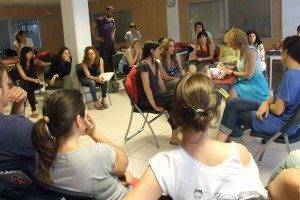Evidence of learning by their 34th week in the womb has been found. This is three weeks earlier than previously thought.
The study followed 32 women from their 28th through 38th weeks of pregnancy to try to find when the ability to learn starts. Each woman had to say a set 15-second nursery rhyme (that they didn’t previously know) 3 times out loud, twice a day for 6 weeks. They then monitored the heart rate of the unborn babies when they listened to someone else saying the same rhyme at certain stages.
Babies showed responses to the ‘learnt’ rhyme around 34 weeks. The mums then stopped repeating the rhyme daily, but the unborn babies responded to the rhymes at 38 weeks, despite not having heard it for a month!
So maybe playing certain types of music or talking and reading to your unborn child really will have an effect – make those choices wisely!
SOURCE: http://bit.ly/1lEBzAl
Emergence and retention of learning in early feral development Charlene Krueger, Cynthia Garvan. Infant Behav Develop 2014. Volume 37, Issue 2, May 2014, Pages 162–173
